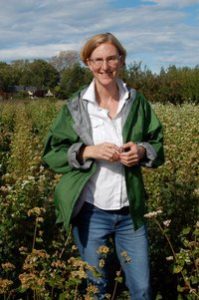
I grew up working and playing in the Oregon countryside next to fields of broccoli, corn, beets, and beans. Strawberry picking was my first job at age 12, as soon as I could get my social security card. I spent my high school years working in the canneries (I can still smell the beets). Later, while studying crops and soils at Oregon State University, I worked with the vegetable industry to develop Integrated Pest Management strategies. At that time, in the mid 1990s, I saw producers start to lose their “base acres” to producers overseas, as the regional vegetable row crop industry struggled to compete with international markets. Sadly, I watched the canneries shut down and the diversity of agriculture in the Willamette Valley diminish as the vegetable industry continued to move overseas.
The Willamette Valley, full of fertile land and a unique growing climate, is a precious natural resource. It saddens me to see farmers struggle to continue vegetable production, but another crop that holds great potential – specialty vegetable seed – is already adding great value to the region. The Willamette Valley is a premier location globally for growing certain species of vegetable seed, including several high-value Brassica seed crops. And it is a crop, unlike some commodities, where producers can compete in an international market, earning at times up to $10,000 to $20,000 per acre. The specialty crop seed industry, now valued at $50 million, has boosted the economic viability of Oregon’s agriculture and rural communities.
But, once again, a valuable sector of Oregon’s agriculture is threatened.
The Oregon Department of Agriculture recently approved canola production in the Willamette Valley where it had previously not been allowed, putting at serious risk the state’s valuable specialty crop seed industry. The restrictions on canola production in this region were previously put in place after much community dialogue and research. The restrictions were deemed necessary for protecting livelihoods and product integrity. Canola plants cross-pollinate with many of its relatives, such as broccoli, radish, rutabaga, turnips, and other brassicas. Seed companies large and small, local and international, have invested in this region because of its unique climate and other factors that provide for optimal seed growing conditions. They have also invested in this region because they have no choice: most of the other potential brassica seed growing regions in the world (e.g. France, Germany, and Australia) have been destroyed because canola planting was permitted in these areas. But now the canola industry, valued at $3 million in the area, risks pushing out a much more diverse, valuable, and otherwise growing industry.
But there’s an opportunity to protect the cultural and economic value of Oregon’s specialty crop seed industry. The House Agriculture Committee should vote “yes” on HB 2427 to ban canola in the Willamette Valley. The risks are well known, and the solution is clear: to protect this unique and valuable region.
If you live in Oregon, sign this petition today, and keep tabs on other ways to engage through Friends of Family Farmers.
